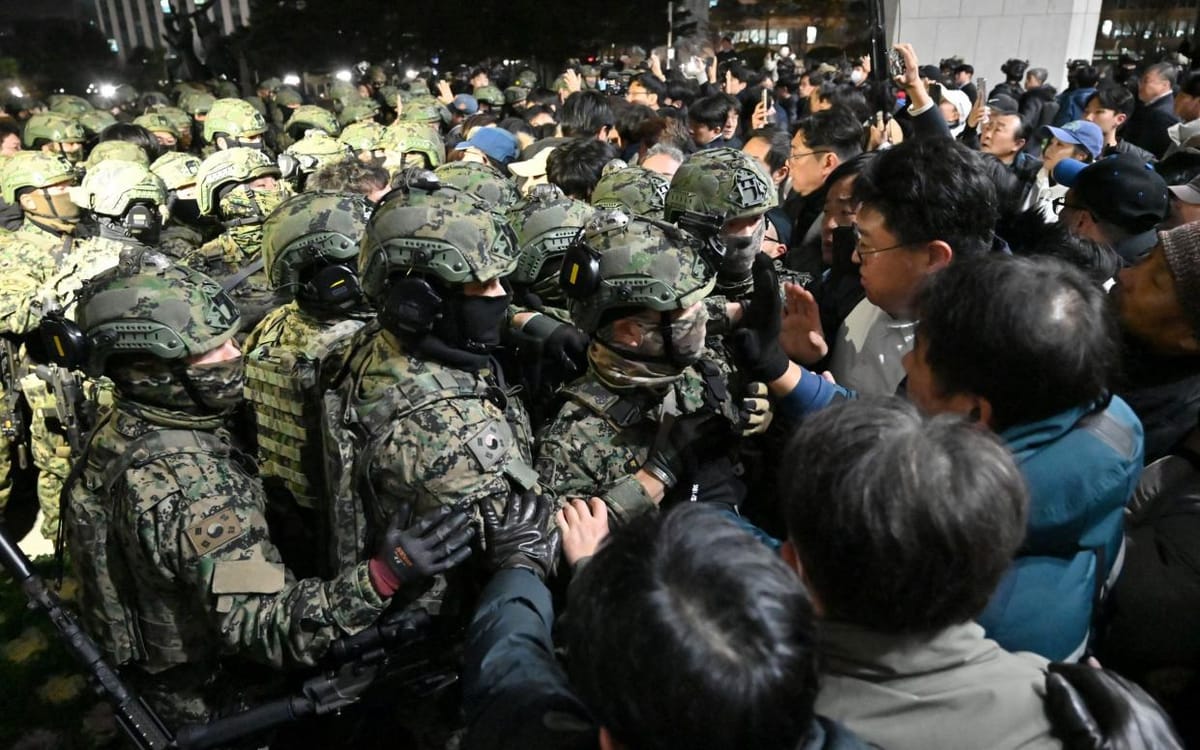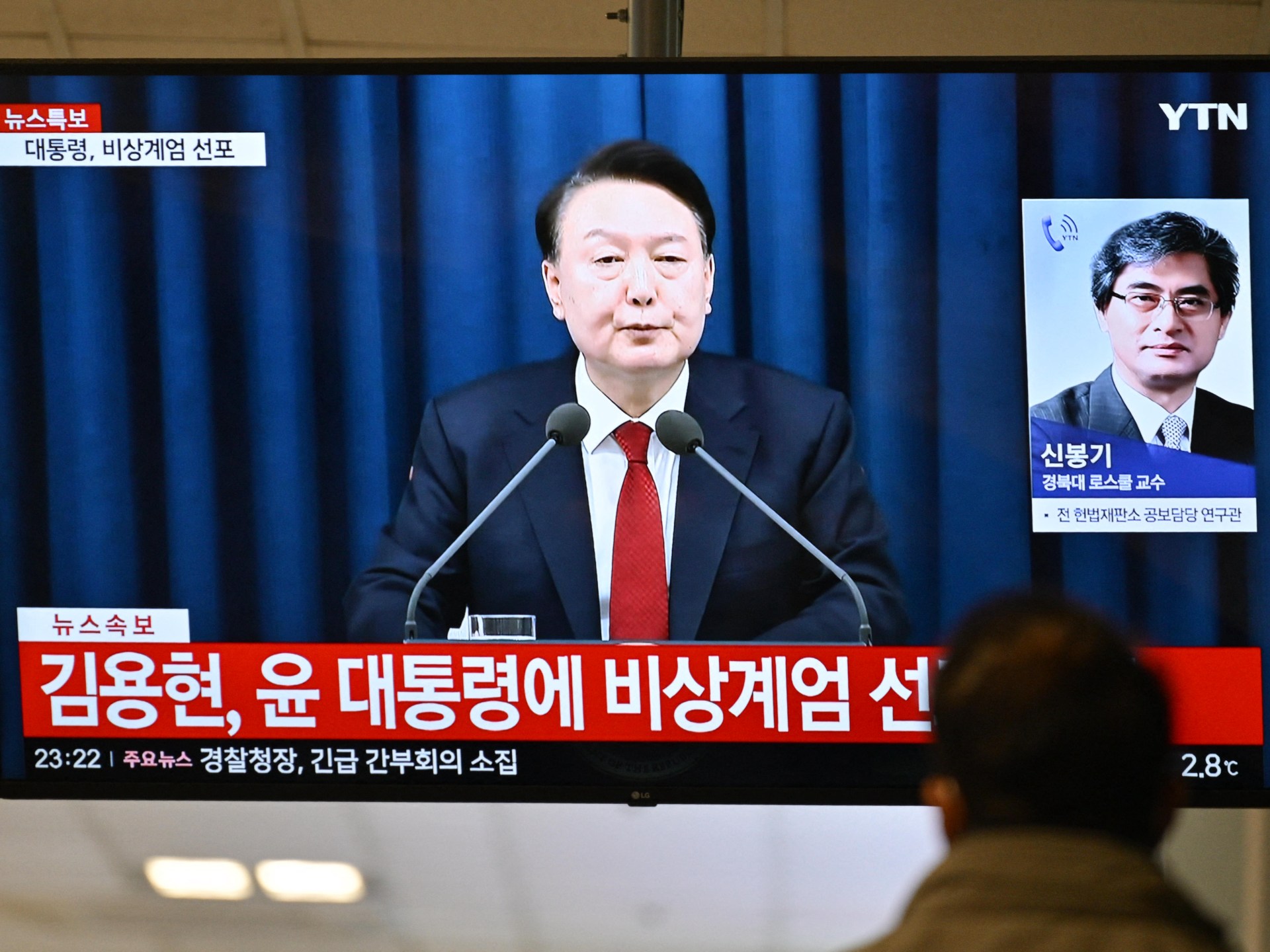
This morning I awoke, as I do sometimes now, to check social media. Since getting on Bluesky recently, I've been reminded of when I first got on Twitter, over a decade ago, and felt "plugged in" to things happening all over the world.
With the state of things in the United States and elsewhere these days, it's hard to feel optimistic even in a more positive informational environment, and, at the start of the morning, things in South Korea took that darker outlook and utterly blackened it.
The President of the Republic of Korea ("South Korea"), Yoon Sook Yoel, a conservative leader who has been both accused of corruption and at odds with a more progressive legislature, declared martial law today.
 Al JazeeraAl Jazeera
Al JazeeraAl Jazeera
I follow South Korean politics at a distance, but I don't have an informed, nuanced "take" on this, so:
In the bare facts of this, Yoon's declaration was the first time martial law had been used since 1980, when President and later dictator Chun Doo-hwan declared it after the 1979 military coup that brought him to power.
As Al Jazeera reported of Yoon as context for the coup:
Since taking office in 2022, Yoon has struggled to push his agendas against an opposition-controlled parliament.
Yoon has also been dismissing calls for independent investigations into scandals involving his wife and top officials, drawing quick, strong rebukes from his political rivals.
Yoon justified his declaration, in contrast, as work that would "safeguard a liberal South Korea from the threats posed by North Korea’s communist forces and to eliminate anti-state elements."
And here's where any semblance of a "take" I have fades. I logged on, read this context this morning, and saw images and videos that looked like this:
South Korea suspends democracy as President Yoon Suk Yeol declares martial law. In Seoul, convoys of special vehicles carrying military personnel move through the streets. Helicopters patrol the sky.
— Anonymous (@youranoncentral.bsky.social) 2024-12-03T15:28:40.184Z
A Woman fights off a soldier in front of the parliament building in South Korea.
— Pop Base (@popbase.tv) 2024-12-03T17:12:50.792Z
Lee Jae-myung, Leader of South Korea's Democratic Party, live-streamed himself scaling the walls of the National Assembly to bypass military barricades so that he could vote to overturn the President's martial law.
— Adam Schwarz (@adamjschwarz.bsky.social) 2024-12-03T16:55:41.973Z
Because I was coming in late, however, I logged on to see the tail end of this historic moment as the legislature voted, while the military (seemingly half-heartedly) tried to break down the doors of the legislative chambers of the National Assembly and prevent lawmakers from voting to nullify the declaration of martial law.
I think it was this image, below, that really hit home the most. Someone said that it was one of the most uniquely optimistic photos that they saw this year, and I have to agree. Far away from any political or technical analysis, this photograph represents so many unique, beautiful, and strange things.
South Korean citizens helped lawmakers scale the National Assembly walls so they could bypass military barricades and vote against martial law.
— Adam Schwarz (@adamjschwarz.bsky.social) 2024-12-03T17:15:53.829Z
The symbolism here is profound: everyday people are literally lifting up a lawmaker, collaboratively fighting to sustain and protect the democracy they both share.
As a Canadian political scientist I respect, Emmett Macfarlane, said:
South Korea is a reminder that, in extreme circumstances, it isn't the courts that can rescue democracy. A President attempting a military coup doesn't care what courts have to say. Political actors and citizens must act against existential threats; the law can't save the rule of law, politics can.
There's a lesson, simply put, that stands in this. And for those of us who worry, as I do, about the state of democracy across the world, that's a stark reminder. There's no tactical or strategic conclusion that I can draw from this or lesson that we can learn in some specific sense in this, other than the most bare-bones: democracy is is hard, and it is not guaranteed.
The Korean people and their legislators appear to have, at least for the moment, stared down a would-be strongman (and perhaps even dictator) and won. I can't offer any more insights to that, but at least in this moment I feel compelled to vocalize my gratitude – this bravery should inspire us all.
Sign up for George Patrick Richard Benson
Strategist, writer, and researcher.
No spam. Unsubscribe anytime.
